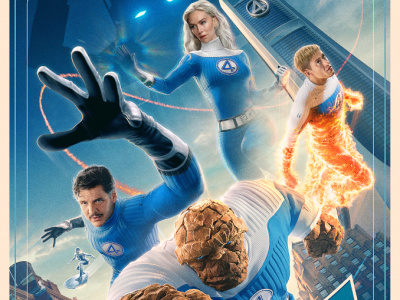Mark Dudley, Illustrator and Sequential Artist, is back and responds to some of the comments that were generated because of his first Talk Back regarding one of Steve Bennett's column (see "Confessions of a Comic Book Guy--The Most Unexpected Black Lanterns of All"):
I would like to respond to some of the opinions expressed concerning my Talk Back response to Steve Bennett's "Confessions of a Comic Book Guy-The Most Unexpected Black Lanterns of All."
I believe that the real issue facing the comic book community is generational and one of responsibility. Older readers like to lament on a time when comic book characters served as both hero and role model. These people solved all of their problems in the space of 22 pages and at the end all was right with the world.
If art does indeed imitate life then we have to put the works into the context of the time they were created. It's interesting to note that during the 30's and 40's the heroes who "don't kill" today, killed all the time. Batman packed heat and the war effort saw comics becoming propaganda tools.
The fifties saw the rise of the Red Scare and the emergence of the Comics Code Authority, which put strict rules on what could and could not be shown in comics. We also saw another type of propaganda, the rise of the "commie busting" heroes.
In the sixties we saw the dawn of the marvel age of comics. Marvel managed to put a little realism into comics. The Fantastic Four was the dysfunctional family; Spidey couldn't pay his rent and was an outlaw. The X-Men was a total allegory for the racism in society. People could relate more to that compared to the "mythological" heroes of DC comics, and these themes reflected the increasing social awareness of the sixties.
The 70's saw comics attack even greater social issues. Marvel and DC both did issues on drug abuse, despite the comic's code. Issues that really didn't fit into the general context of the stories us fans were used to. Heck, these books didn't even have comics code approval.
I don't want to belabor my point, but for better or worse comics are temporal windows. Just like any art form it's going to reflect the environment from which it was spawned. For better or for worse today's comics are spawned in a primordial soup of wider acceptance of adult themes and sexuality so their should be no surprise that we see this stuff in comics.
I think that the definition of what makes a hero is also subject to temporal influence. Back in the day a hero was generally a person who stood for upholding the status quo and battling any and all threats to this status quo and its morality. Later a hero was seen as someone willing to take on that status quo and all of its oppressive ideas. Nowadays, with the advent of videogames and their ability to allow the player to influence the story, and with our being able to access millions of different views on the Internet, I think the idea of what makes a hero is basically up for grabs. One person's hero is another person's oppressor.
Using a show like NCIS as a barometer of what you think is ideal in terms of demographic programming is interesting because I really think that if NCIS was head to head with something like Heroes or Lost, we would really gain a true understanding of what types of programs people want to see. I would even wager that head to head with a program like Battlestar Galactica, NCIS would not do that well. Because, unlike NCIS, the shows I have mentioned reflect the mood of today. We live in a time were people are cynical of any type of morality that is endorsed by the religious right or the public sector.
I would like to ask a question related to all of the media we ingest, TV included. Why is it that we go up in arms when our "heroes" discuss their sexual trysts yet no one talks about the excessive levels of violence that our kids see today? Yeah we as a society, are notorious for bagging on the sexual stuff but how about the barbaric levels of violence these kids ingest on an almost minute-by-minute basis? I don't see Ms. Penny or anyone else bringing up this issue. I mean, the majority of these superhero comics are about people bashing the heck out of each other and causing ridiculous amounts of collateral damage. Even if we suspended or disbelief for a second, do you actually think that kids today buy the fact that "no innocent characters where harmed in the making of this comic"?
My only real problem with comics is that we never get to see the aftermath or cost of any of these superheroes exploits. If we saw in the aftermath of one of Superman's titanic battles that maimed a little girl and we got a chance to see how Superman as a three-dimensional character was forced to deal with this, I think that would be vary interesting and really work to create another layer of humanity for the guy. If we say Hal Jordan's threesome end up with an unwanted pregnancy, that would really bring home the reasons behind us not being down with this type of behavior. No one wants to deal with that however, because it would be "uncharacteristic" of our heroes.
Mr. Bennett says that his only problem with the threesome incident is in the fact that it seems to him that comics no longer has a line you shouldn't cross. Well, let me ask this question? What is the rating system for? Isn't that a line? If you feel a comic that you are reading has content that doesn't fit the rating system that be proactive, DO SOMETHING ABOUT IT!! Write the publisher and state your case on those grounds. While I love the fact that we have this forum to express our views, it is no substitute for direct action.
Finally, when I was growing up my heroes were people that I existed here on earth. People like Gandhi, Martin Luther King, Malcolm X, John F. Kennedy, FDR and my mother who raised me in a single parent home. I didn't look to the mythical for my morality as I had very real examples of what was good for me and what wasn't. I think parents don't take enough responsibility when it comes to what their children do, see or hear. Literature has its place in forming our opinions but nothing trumps our direct influence from the people around us.
The opinions expressed in this article are solely those of the writer, and do not necessarily reflect the views of the editorial staff of ICv2.com.
'I Would Like to Respond'
Posted by ICv2 on August 27, 2009 @ 11:00 pm CT
MORE TALK BACK
'How Would You Deal with This?'
April 15, 2024
Ralph DiBernardo of Jetpack Comics shares his frustrations on street release dates being ignored and the lack of consequences.
'We Need More Long-Term Thinking.'
November 30, 2023
In this Talk Back, Allen Berrebbi, Director of Business Development for Big Bang Comics, comments on the current state of the Direct Market and offers a couple of suggestions to help save it.
MORE COMICS
Showbiz Round-Up
July 28, 2025
San Diego Comic-Con is in the books, and lots of Hollywood news has hit the wire. Time for a round-up!
Also: Longtime Eisner Awards Administrator Jackie Estrada to Retire
July 26, 2025
Jackie Estrada, who has been running the awards since 1990, is stepping down.







